Weekends bring families together around dinner tables across the globe. While Saturday and Sunday routines vary by culture, one constant remains: special meals that mark the end of the work week and celebrate family time.
These traditional weekend dishes tell stories of heritage, community, and comfort. From slow-cooked stews that simmer all day to elaborate brunches that stretch into the afternoon, weekend meals reflect what matters most to different cultures. Understanding these traditions helps us appreciate the universal desire to gather, share, and nourish our loved ones.
Let’s explore how families around the world transform simple ingredients into meaningful weekend experiences through food.
European Weekend Traditions
Sunday Roast in Britain
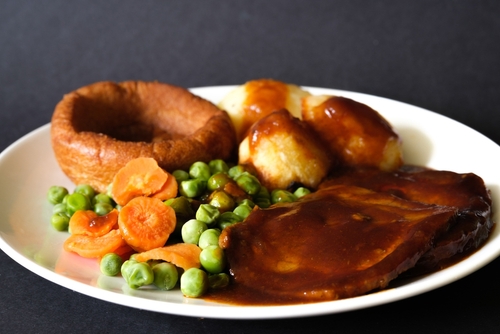
The British Sunday roast represents more than just a meal—it’s a weekly ritual that brings generations together. Families prepare roasted beef, lamb, or chicken alongside Yorkshire pudding, roasted vegetables, and rich gravy.
This tradition dates back centuries when families would place meat in communal ovens before attending church services. The meal would cook slowly while they worshipped, creating perfectly tender results by the time they returned home.
Modern British families still honor this custom, often inviting extended family members to share the elaborate spread. The preparation requires time and care, making it perfect for leisurely weekends when rushing isn’t necessary.
Italian Sunday Sauce
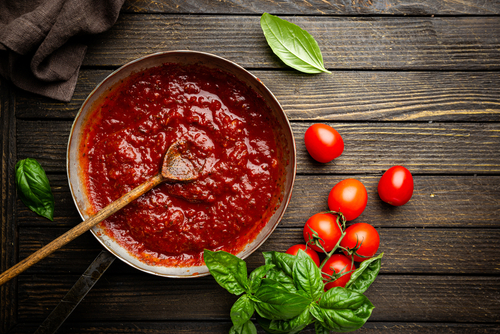
In Italian households, Sunday means sugo della domenica—the Sunday sauce. This rich tomato sauce simmers for hours, filling homes with aromatic herbs and creating anticipation for the evening meal.
Families gather in kitchens to prepare fresh pasta, share stories, and taste the developing sauce throughout the day. Each region has its own variation, with some adding meatballs, others including sausage, and many featuring locally grown ingredients.
The extended cooking time transforms simple tomatoes into complex, flavorful sauces that coat pasta perfectly. This tradition emphasizes patience, family involvement, and the belief that the best meals cannot be rushed.
German Weekend Brunch

German families embrace Sonntagsbrunch—extended Sunday brunches featuring both sweet and savory elements. Tables overflow with fresh breads, cold cuts, cheeses, jams, and soft-boiled eggs served in decorative egg cups.
These brunches can last for hours, encouraging conversation and relaxation. Families often include seasonal specialties like asparagus in spring or hearty soups during winter months.
The German approach to weekend dining emphasizes abundance and variety, allowing each family member to create their perfect combination of flavors.
Asian Weekend Specialties
Japanese Weekend Hot Pot
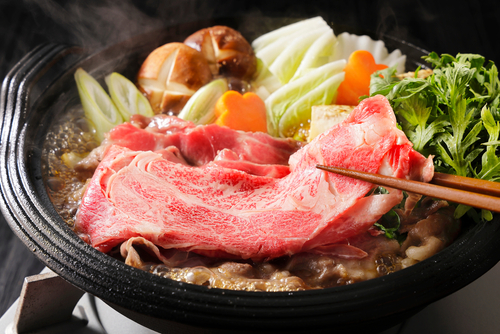
Japanese families often gather for nabe (hot pot) during weekends, especially in cooler months. This communal cooking method involves simmering vegetables, tofu, and meat in flavorful broths at the dining table.
Everyone participates by adding ingredients to the shared pot and cooking items to their preferred doneness. The interactive nature creates natural conversation opportunities and teaches younger family members about ingredient selection and timing.
Different regions feature unique hot pot styles, from Tokyo’s chanko nabe to Osaka’s oden. Each variation reflects local tastes and available ingredients.
Chinese Weekend Dim Sum
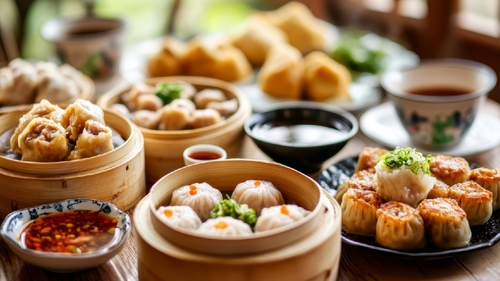
Weekend dim sum represents a cherished Chinese dining tradition where families gather at restaurants or prepare elaborate spreads at home. Small plates feature dumplings, buns, rolls, and other bite-sized delicacies.
The variety allows everyone to sample different flavors and textures while sharing stories and catching up on the week’s events. Preparation often involves multiple family members working together to fold dumplings and steam buns.
This tradition emphasizes abundance through variety rather than large portions, creating opportunities to try new flavors without overwhelming individual appetites.
Korean Weekend Banchan
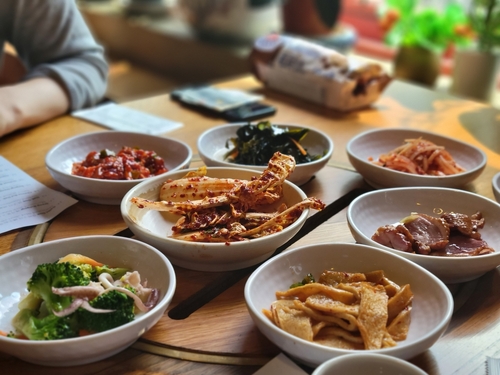
Korean families prepare extensive banchan (side dish) spreads for weekend meals, featuring kimchi, pickled vegetables, seasoned greens, and other small plates alongside rice and soup.
These colorful arrays require significant preparation but create visually stunning and nutritionally balanced meals. Family members often have specific dishes they’re responsible for preparing, creating shared ownership of the dining experience.
The variety ensures everyone finds flavors they enjoy while exposing them to different tastes and textures throughout the meal.
Middle Eastern and African Traditions
Moroccan Weekend Tagine
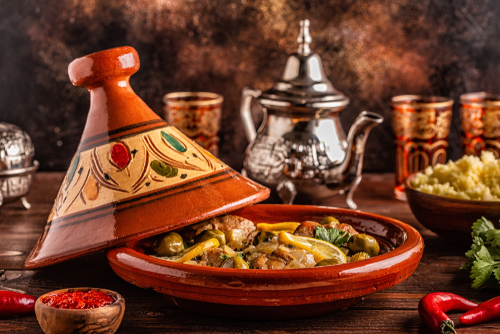
Moroccan families gather around fragrant tagines during weekends, enjoying slow-cooked stews featuring meat, vegetables, and aromatic spices. The conical clay vessels create perfectly tender results through gentle, even cooking.
Common combinations include chicken with preserved lemons and olives, or lamb with apricots and almonds. The sweet and savory flavor profiles reflect Morocco’s position at the crossroads of Africa, Europe, and the Middle East.
Families often prepare couscous alongside tagines, creating complete meals that satisfy both hunger and cultural connections.
Ethiopian Weekend Coffee Ceremony
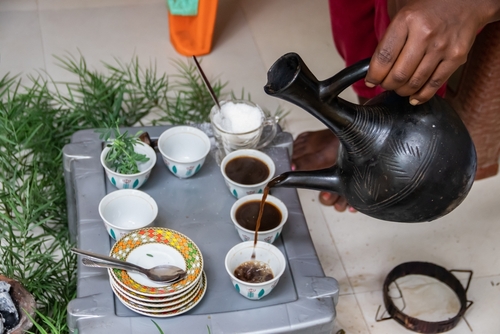
Ethiopian families dedicate weekend afternoons to elaborate coffee ceremonies that can last several hours. The process involves roasting green coffee beans, grinding them by hand, and brewing in traditional clay pots.
This ritual brings families together through shared participation in each step. The aromatic experience creates anticipation while encouraging conversation and connection.
The ceremony often accompanies traditional foods like injera (sourdough flatbread) and various stews, creating complete cultural experiences that honor Ethiopian heritage.
Latin American Weekend Gatherings
Mexican Weekend Pozole
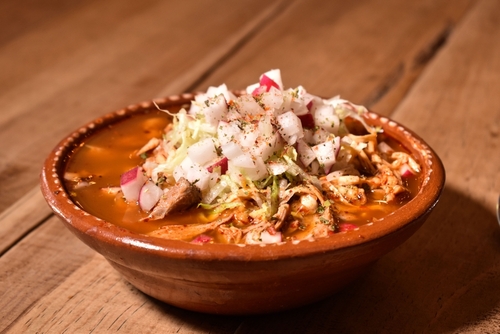
Mexican families prepare pozole for weekend celebrations, creating hearty soups featuring hominy, meat, and rich broths. This traditional dish requires hours of preparation but feeds large groups effectively.
Regional variations include red pozole with chile-based broths, white pozole with clear broths, and green pozole featuring tomatillo-based preparations. Each style reflects local ingredients and family preferences.
The communal nature of pozole preparation brings family members together in the kitchen, sharing techniques and stories while creating meals that nourish both body and spirit.
Brazilian Weekend Feijoada
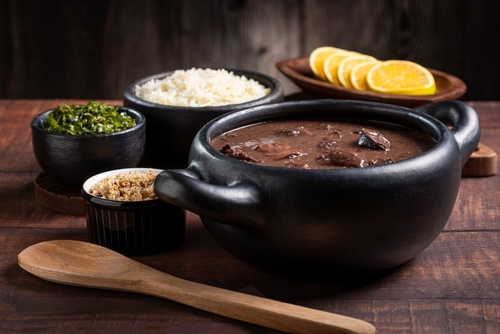
Brazilian families dedicate Saturday afternoons to preparing feijoada, a rich black bean stew featuring various cuts of pork and beef. This national dish requires slow cooking and careful attention to develop complex flavors.
Traditional accompaniments include rice, collard greens, orange slices, and farofa (toasted cassava flour mixture). The complete meal creates a festival of flavors and textures that celebrates Brazilian culinary heritage.
Preparation often begins Friday evening with bean soaking, making feijoada a true weekend commitment that brings families together through shared effort and anticipation.
North American Weekend Traditions
American Weekend Pancakes

American families embrace weekend pancake breakfasts as opportunities to slow down and enjoy leisurely mornings together. Fluffy stacks topped with butter and maple syrup create comfort food experiences that mark the transition from busy weekdays to relaxed weekends.
Many families have special pancake recipes passed down through generations, featuring unique ingredients like buttermilk, blueberries, or chocolate chips. The cooking process often involves children helping measure ingredients and flip pancakes.
This tradition emphasizes the luxury of time—something weekday mornings rarely provide—and creates positive associations with family gatherings.
Canadian Weekend Tourtière

French-Canadian families prepare tourtière during weekends, especially around holidays. These savory meat pies feature spiced ground pork enclosed in flaky pastry crusts.
The preparation requires time and skill, making it perfect for weekend cooking when families can work together to create perfect crusts and well-seasoned fillings. Each family often has unique spice combinations that reflect their heritage and preferences.
These pies can be prepared in advance and reheated, making them practical for busy families while maintaining traditional flavors and techniques.
Why Weekend Meals Matter
Traditional weekend meals serve purposes beyond simple nourishment. They create regular opportunities for families to connect without the pressure of weekday schedules. The extended preparation times encourage participation from multiple family members, teaching cooking skills and cultural knowledge naturally.
These traditions also provide stability and continuity in rapidly changing world. Children who grow up participating in weekend meal traditions often continue them with their own families, preserving cultural connections across generations.
The emphasis on quality time over convenience helps families prioritize relationships and create positive associations with food preparation and sharing.
Frequently Asked Questions
What makes weekend meals different from weekday meals?
Weekend meals typically require more preparation time and involve more family participation. They often feature special ingredients or cooking methods that aren’t practical for busy weeknights, creating opportunities for families to gather and cook together.
How can busy families incorporate traditional weekend meals?
Start with simplified versions of traditional dishes and gradually add complexity as time allows. Focus on one special weekend meal rather than trying to create elaborate spreads for every weekend meal. Involve family members in age-appropriate preparation tasks to share the workload.
Are weekend meal traditions important for children?
Weekend meal traditions help children develop cultural identity, cooking skills, and positive associations with family time. They create predictable opportunities for connection and teach patience through extended preparation processes.
Can single people or couples benefit from weekend meal traditions?
Weekend meal traditions work well for households of any size. Single people can use special weekend cooking as self-care opportunities, while couples can create intimate traditions that strengthen their relationship through shared experiences.
How do I start new weekend meal traditions?
Choose dishes that reflect your cultural background or personal interests. Start simple and focus on consistency rather than perfection. Invite friends or family members to participate and help establish the tradition through shared positive experiences.
Creating Your Own Weekend Traditions
Weekend meals offer opportunities to slow down, connect with loved ones, and create lasting memories through food. Whether you choose to honor your cultural heritage or create new traditions that reflect your family’s unique preferences, the key lies in consistency and intention.
Start by selecting one weekend meal that brings your household together. Focus on dishes that require some preparation time, encouraging participation and conversation. As these new traditions take root, you’ll discover the profound satisfaction that comes from transforming simple ingredients into meaningful family experiences.
The world’s diverse weekend meal traditions remind us that food serves as much more than fuel for our bodies—it nourishes our relationships, preserves our cultures, and creates the moments we remember most fondly.
